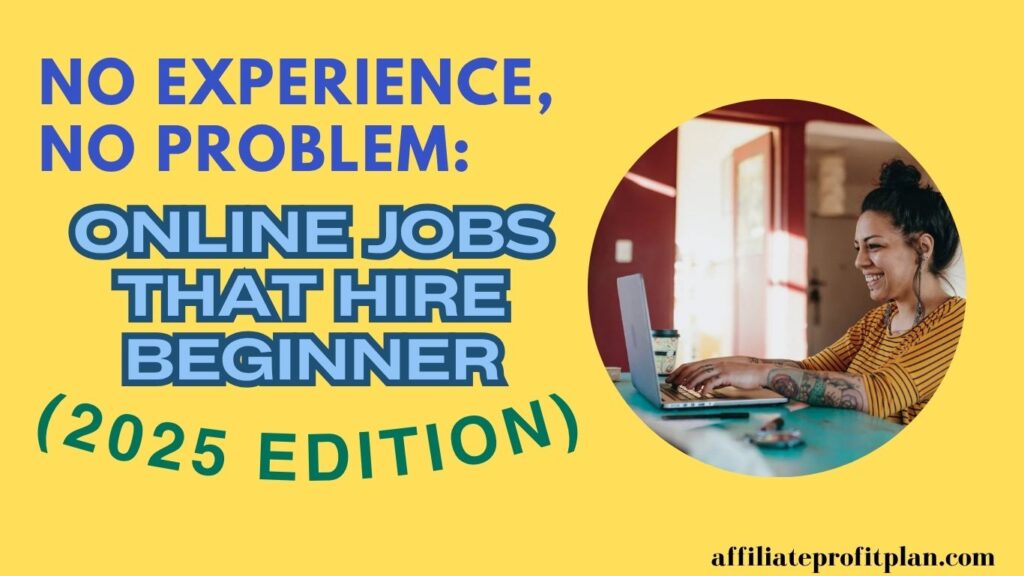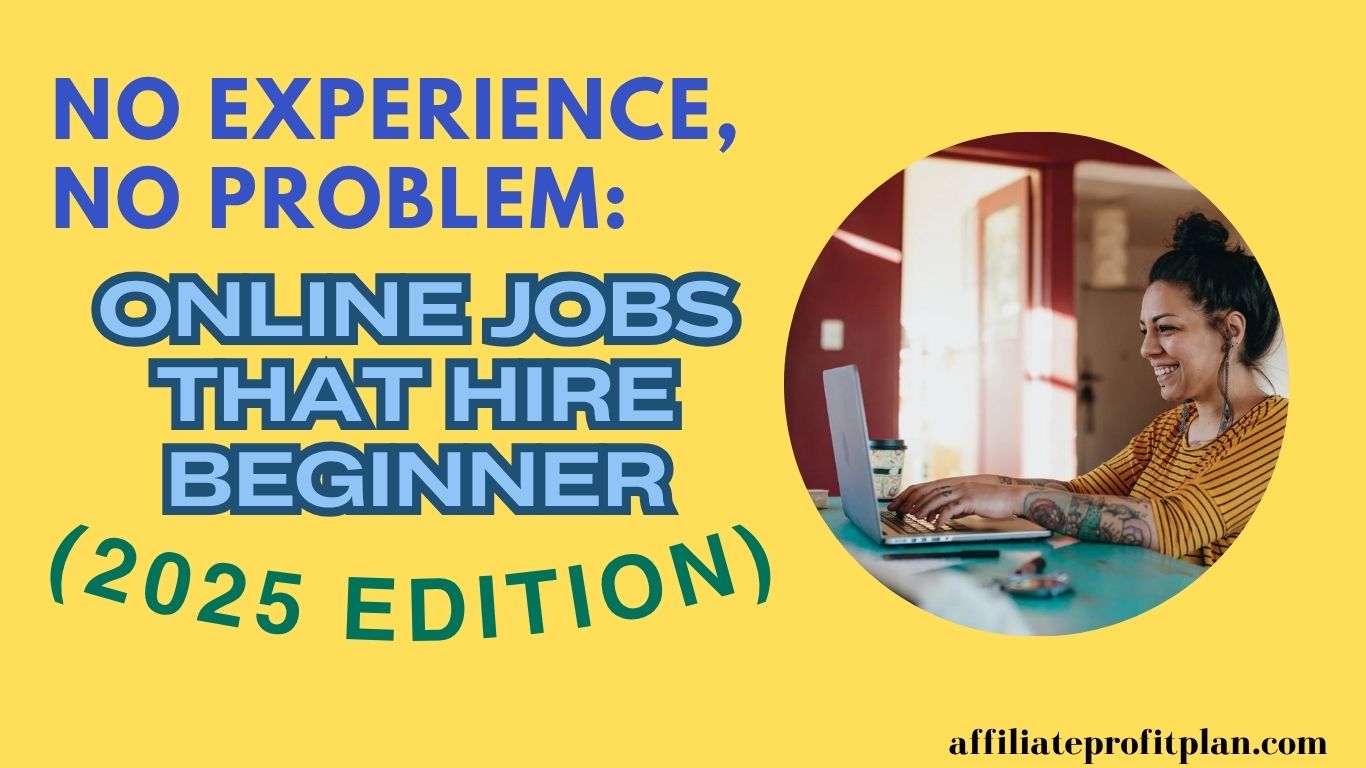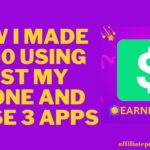Welcome to my article No Experience, No Problem: Online Jobs That Hire Beginners (2025 Edition). So, you want to make money online in 2025—but you don’t have a degree in rocket science, a decade of experience, or a portfolio that screams “Hire me, I’m a remote wizard!” Don’t worry. You’re not alone, and better yet: you’re not out of options.
This guide breaks down the best entry-level remote jobs hiring in 2025, what skills (if any) you need, and how to get started without spiraling into a YouTube hole called “How to be productive when you’re incredibly overwhelmed.” Spoiler: you don’t need to be a tech genius, social media influencer, or crypto bro. Just a willingness to learn, a stable internet connection, and maybe a decent cup of coffee.
So, if you’re ready to swap “No experience” for “No problem,” keep reading. You’re about to discover online jobs that don’t care what your résumé says—as long as you’re ready to hit the ground clicking.
Access My Proven Blueprint for $50-$100 Daily Income – Watch This FREE Video Now >>>

What Makes a Job Beginner-Friendly?
Let’s be honest—when you’re new to the online job world, the last thing you want is to apply for a position that “requires 3+ years of experience, 4 obscure software certifications, and the ability to juggle flaming spreadsheets.” Uh… hard pass.
So how do you know if a job is actually beginner-friendly and not just pretending to be one on LinkedIn?
Here’s what to look for when hunting for online jobs that welcome newbies with open (virtual) arms:
✅ 1. No Degree or Formal Experience Required
This is the golden ticket. True beginner-friendly jobs don’t expect a fancy diploma or a résumé that reads like the career arc of Tony Stark. If a listing says “no experience necessary” or “we train you,” that’s your green light. Even better if it says “great for students or stay-at-home parents.” Translation: they’re ready to meet you where you are.
🧰 2. Basic Skills Are Enough
You don’t need to be a tech wizard or marketing ninja. Jobs that welcome beginners usually ask for simple stuff: typing, clear communication, staying organized, and not ghosting your boss mid-project. If you can use email, follow instructions, and Google things without spiraling into conspiracy theories, you’re already ahead of the curve.
📚 3. Training or Onboarding Is Provided
Many beginner-friendly employers or platforms offer structured onboarding or even mini training courses. These are often short and sweet, and they help you get up to speed without needing to pretend you understand words like “KPIs” or “API integrations.” (You don’t have to Google them. It’s fine.)
🤝 4. You’re Not Competing with the Pros
Platforms and jobs built for beginners often segment roles by skill level. Think entry-level freelance gigs, task-based jobs, or support roles that don’t require years of polished experience. You won’t be bidding against full-stack developers or copywriters who charge more per hour than your car payment.
🏠 5. Flexible, Remote, and Task-Based
The best beginner jobs let you work when you can, where you want. Look for listings that offer flexible hours, part-time or freelance options, and project-based work. No commute, no dress code, no weird office fridge politics.
If a job checks most of these boxes, it’s a good bet for beginners. And if not? Politely close the tab and move on—you’ve got better things to apply for.
Top Online Jobs That Hire Beginners in 2025
Welcome to the buffet of beginner-friendly online jobs. No experience? No problem. No résumé? Still fine. No clue what you’re doing? Honestly, that’s where half of us started.
The truth is, 2025 is peak season for entry-level online work. Companies are ditching old-school hiring requirements in favor of skills, communication, and showing up on time (which, let’s be real, is 90% of adulting). Whether you want a side hustle, a full-time gig, or something to fund your snack addiction, here are the top beginner-approved options that are hiring now—and likely won’t ghost you.
🧑💻 1. Virtual Assistant (VA)
What you do: Schedule appointments, answer emails, manage spreadsheets, make your client feel like a boss (because you’re basically running their life).
Why it’s beginner-friendly: Many tasks are administrative and trainable. Plus, there are tons of VA communities that offer free or low-cost training.
Platforms to try: Belay, Fancy Hands, Upwork, Freelancer
💡Pro tip: You don’t need to be a productivity guru—just organized and slightly obsessed with checking things off to-do lists.
🛜 2. Online Chat or Email Support
What you do: Answer customer questions, solve basic issues, and occasionally talk people off the “Why won’t this work?!” ledge.
Why it’s beginner-friendly: Scripts and FAQs do most of the heavy lifting, and you don’t have to talk on the phone (introverts, rejoice).
Platforms to try: ModSquad, Arise, LiveWorld
💡Bonus: Night owls can find overnight shifts—and no, you don’t need to wear pants.
📥 3. Data Entry or Microtasks
What you do: Type stuff, copy-paste things, tag images, click buttons… rinse and repeat.
Why it’s beginner-friendly: Minimal thinking, flexible hours, and often no training required.
Platforms to try: Clickworker, Microworkers, Amazon MTurk, Remotasks
🧠 Reality check: The pay can be low, but it’s an easy starting point to build confidence (and a small emergency pizza fund).
🗣️ 4. Online English or Conversation Tutor
What you do: Chat with students who want to improve their English—no teaching degree required.
Why it’s beginner-friendly: Just speak clearly and follow a lesson guide (or wing it like a pro).
Platforms to try: Cambly, Preply, Italki
💸 Heads up: Some platforms pay by the minute, but it adds up—especially if you enjoy talking to people from around the world while sipping coffee.
✍️ 5. Freelance Writing (Even If You’re Not “A Writer”)
What you do: Blog posts, product descriptions, basic SEO content. No novels. No Shakespeare pressure.
Why it’s beginner-friendly: You can start with low-competition gigs and improve as you go. Plus, AI tools (like yours truly) can help draft and edit.
Platforms to try: Textbroker, Fiverr, Upwork, PeoplePerHour
🖋️ Insider tip: Build a tiny portfolio with 2–3 samples on Google Docs and you’re in business.
📱 6. Social Media Content Assistant
What you do: Help creators or small businesses with basic tasks—scheduling posts, replying to comments, finding hashtags, or editing short-form videos.
Why it’s beginner-friendly: If you’ve ever posted a meme or used TikTok for longer than 5 minutes, congrats—you’re halfway there.
Platforms to try: Upwork, Contra, Freelancer, direct outreach to creators or small biz pages
📈 Grow-as-you-go: Start small, learn on the job, and scale up to higher-paying social media management roles later.
These aren’t just filler gigs—they’re launchpads. Start small, get some experience, and build your confidence. From there, you can raise your rates, move into more advanced roles, or stack multiple jobs into one big beautiful patchwork of online income.
Free Tools & Resources to Help You Get Started
Okay, you’ve picked a beginner-friendly job (or five). You’re excited. You’re ready. But now your browser has 37 tabs open, your to-do list says “Start everything,” and your brain is playing elevator music on loop. Take a breath. You don’t need to pay for expensive tools or take a 10-week bootcamp to get started online.
Access My Proven Blueprint for $50-$100 Daily Income – Watch This FREE Video Now >>>
Here’s your starter pack of totally free tools and resources that’ll help you hit the ground running—without maxing out your credit card or selling your soul to productivity TikTok.
🧠 1. ChatGPT (Hey, That’s Me!)
Best for: Writing help, brainstorming, job descriptions, emails, learning literally anything
ChatGPT can help you write cover letters, prep for interviews, create content outlines, or figure out what “remote asynchronous role” even means. Think of it as your 24/7 intern, mentor, and slightly sarcastic sidekick.
👉 chat.openai.com — Free plan available
🖋️ 2. Grammarly
Best for: Catching typos, fixing awkward sentences, and making you sound like a pro (even on 3 hours of sleep)
If you’re writing emails, blog posts, or cover letters, Grammarly is like having an editor that doesn’t judge your caffeine intake.
👉 grammarly.com
🎨 3. Canva
Best for: Designing social media graphics, resumes, blog headers, and presentations—even if you failed art class
You can create professional-looking visuals with drag-and-drop ease. No Photoshop. No design degree. No crying.
👉 canva.com
🗃️ 4. Google Workspace (Docs, Sheets, Drive)
Best for: Organizing your work, writing documents, and sharing files with clients like a digital adult
You’ll use Docs for writing, Sheets for tracking income (or snack expenses), and Drive to store it all safely in the cloud.
👉 workspace.google.com
🧩 5. Trello or Notion
Best for: Task management, to-do lists, and keeping your projects from turning into chaos
Trello uses boards and cards (like digital sticky notes). Notion is more customizable and nerdy—but in a good way.
👉 trello.com
👉 notion.so
📚 6. YouTube (a.k.a. Free University)
Best for: Learning literally anything: how to be a VA, how to pass a Cambly interview, or how to make money with Upwork
Search “[your job] + tutorial” and fall down a rabbit hole of helpful walkthroughs—with minimal effort.
Just don’t get distracted by conspiracy theories or llama grooming videos. (Unless that’s your niche now. No judgment.)
🎓 7. Free Courses & Skill-Builders
- Coursera & edX – Free business, writing, and tech courses
- Google Digital Garage – Free marketing and business classes
- HubSpot Academy – Free certifications for marketing, content, and more
- Skillshare (Free trial) – Great for creative and freelance skill-building
These tools won’t turn you into an overnight expert—but they’ll give you a huge head start and help you look like you know what you’re doing (and eventually, you will). No gatekeeping. No expensive software. Just real support to help you show up, get hired, and start earning.
How to Stand Out (Even Without Experience)
Let’s face it: applying for online jobs with no experience can feel like showing up to a potluck with nothing but napkins. But here’s the truth: everyone starts somewhere, and standing out as a beginner isn’t about faking experience—it’s about showing effort, personality, and a little creative hustle.
Here’s how to make hiring managers (and algorithms) say, “Wait a minute… we like this one.”
🎯 1. Start With a Killer Profile (That Doesn’t Read Like a Sad Diary Entry)
If you’re using platforms like Upwork, Fiverr, or online tutoring sites, your profile is your storefront. Skip the generic “I’m a hard-working individual who is passionate about working hard.” No one knows what that means.
Instead, write something friendly, clear, and client-focused. For example:
“Hi! I help small businesses manage their inboxes, calendars, and chaos. While I’m new to virtual assisting, I’m not new to getting stuff done. I’m organized, quick to learn, and mildly obsessed with color-coded spreadsheets.”
💡 Pro tip: Use real-life skills (like managing your household or helping friends with social media) as examples—even if they weren’t paid gigs.
📄 2. Create a Mini Portfolio (Even if You’ve Never Had a Client)
No experience? No problem—make your own. Write a sample blog post, design a mock social media calendar, or record a short video doing what you’d offer as a service.
These samples don’t need to be perfect. They just need to show:
- You understand the job
- You can produce something decent
- You’re willing to put in effort
Tools like Google Docs, Canva, and Notion are perfect for hosting your samples. And no, you don’t need a full website. (Yet.)
💌 3. Write Job Applications That Sound Human
If you’re applying directly to jobs (on platforms like Remote OK, We Work Remotely, or even Reddit), keep your message short, polite, and not robotic. Nobody likes a cover letter that feels like it was copy-pasted from a 1998 résumé template.
Instead, try this:
“Hey there! I saw your post looking for a data entry assistant. While I’m new to freelance work, I’m fast, reliable, and have zero fear of spreadsheets. I’d love to help you get this done—and get it done right.”
Then link to your samples or portfolio, and sign off like a normal person. No need to end with “Sincerely yours in productivity.”
📣 4. Leverage What You Do Have: Soft Skills + Willingness to Learn
You might not have job titles or fancy tools under your belt, but employers love:
- Great communication
- Reliability (aka showing up when you say you will)
- Eagerness to learn
- Friendly attitude
Put that front and center. Seriously, many clients would rather hire someone they enjoy working with and train them—than deal with an experienced diva who answers emails like a robot programmed in 2006.
📢 5. Get Social (The Strategic Kind)
Join beginner-friendly Facebook groups, Reddit threads (like r/WorkOnline), and LinkedIn communities where clients and freelancers hang out. Engage, ask questions, and respond to posts looking for help.
A lot of gigs are filled before they even get posted publicly—and being present in the right communities gives you a shot at those hidden gems.
💸 6. Be Honest About Where You Are—And Confident About Where You’re Going
There’s power in transparency. Say something like:
“I’m just starting out in online freelancing, but I’m committed, communicative, and ready to prove myself.”
Clients know everyone has a Day 1. They just want to know you won’t flake by Day 3.
In short, standing out as a beginner isn’t about tricking people into thinking you have experience—it’s about showing that you’re ready to learn, willing to work, and easy to work with.
What to Expect — Pay, Growth, and Realistic Goals
Let’s get real for a second. You’ve probably seen those TikToks that promise you can make $500 a day working 2 hours from your couch with nothing but your phone and some mysterious “strategy.” Spoiler alert: 99% of those videos cut out right before the person burns out, gets scammed, or starts aggressively selling digital planners.
Here’s the truth: making money online as a beginner in 2025 is 100% possible—but it’s not magic. You won’t get rich overnight, but you can build something real, reliable, and totally pants-optional. Let’s talk numbers, growth, and what you can actually expect.
💵 How Much Can You Earn as a Beginner?
Ah yes, the golden question. The answer? It depends (ugh, I know).
Here’s a rough guide to beginner-level earnings:
| Job Type | Starting Rate (2025 Avg) |
| Virtual Assistant | $8–$20/hour |
| Freelance Writing | $0.02–$0.10/word |
| Data Entry / Microtasks | $3–$10/hour |
| Online Tutoring (e.g. Cambly) | $10–$15/hour |
| Chat Support | $12–$18/hour |
| Social Media Help | $10–$20/hour |
🧠 Important Note: These numbers can vary by platform, country, and your hustle level. You won’t retire on Day One, but you can absolutely start seeing money hit your PayPal (or bank account) faster than a lot of offline jobs.
📈 How Fast Can You Grow?
The beauty of online work is your growth is often in your hands—not your manager’s “we’ll revisit this at your annual review” nonsense.
Here’s what your timeline might look like:
- Month 1–2: You’re learning, applying, possibly earning small amounts from microtasks or test gigs. You might feel awkward. That’s normal.
- Month 3–6: You’ve found a rhythm. You’re more confident. You’ve got reviews, repeat clients, and maybe a raise or two.
- Month 6–12: You’re niching down, raising your rates, and possibly juggling multiple income streams. You go from “beginner” to “in-demand” without realizing it.
🚀 Secret tip: The freelancers who grow the fastest aren’t the most talented—they’re the most consistent and open to learning.
🎯 Setting Realistic Goals (That Won’t Make You Cry)
Starting out, your first goal shouldn’t be to hit $10K/month or buy a Tesla. That’s just setting yourself up for stress eating and career FOMO.
Here are realistic, sanity-friendly milestones:
- ✅ Goal 1: Land your first paying gig (even if it’s just $10—you’re officially “in business”)
- ✅ Goal 2: Build a mini portfolio or get 1–2 testimonials
- ✅ Goal 3: Earn your first $100, then $1,000
- ✅ Goal 4: Create repeat income from regular clients or steady platforms
- ✅ Goal 5: Begin raising your rates and saying “no” to lowball offers with grace and slightly smug confidence
Remember, progress in online work is not linear. You might go a week with no work, then land three gigs at once. Don’t panic. That’s just the freelance version of weather.
🧘♂️ The Mindset Shift That Helps Most
Don’t treat your first online job like a lottery ticket. Treat it like a starter seed. You water it, give it sunlight (okay, effort), and eventually, it grows into something surprisingly awesome.
The wins will start small—an email from a happy client, a payment notification, your first “Can you do more work for us?” message. These are huge. Celebrate them. Screenshot them. Tell your dog. Whatever works.
TL;DR: You probably won’t be rich next week. But if you stay consistent, stay curious, and stay out of scammy side hustle rabbit holes, your first few months of online work can lead to a flexible, growing income stream you actually enjoy showing up for.
Conclusion + Call to Action
So, here we are. You started this article wondering if online work in 2025 was some mythical unicorn that only appeared for tech bros and TikTok side hustlers. But now? You’ve got the inside scoop, a list of beginner-friendly job options, free tools to help you get started, and a pretty realistic view of what to expect—minus the sugarcoating and “I made $50,000 in a weekend” nonsense.
Access My Proven Blueprint for $50-$100 Daily Income – Watch This FREE Video Now >>>
Let’s recap your new game plan (because we love a good checklist around here):
✅ You don’t need experience to start online
✅ There are actual jobs out there for beginners—no scams, no crypto cults
✅ You can start earning small, then build up as you learn
✅ Free tools exist to help you look way more professional than you feel
✅ Growth is real, possible, and honestly kind of fun if you lean into it
Sure, you might not feel 100% ready—and guess what? No one ever does. Even the people with polished portfolios and fancy headshots still have moments where they Google “how to invoice without sounding awkward.” Starting now, as you are, with what you know? That’s how everyone begins. You’re in good company.
Now for your next move:
🎯 Your Call to Action (a.k.a. Time to Do the Thing)
- Pick one online job that sparked your interest. Not five. Not twelve. Just one.
- Sign up for one platform related to that job (Fiverr, Upwork, Cambly—pick your player).
- Create one sample or short profile blurb to show what you can do.
- Apply to one gig. Even if your palms sweat. Especially if your palms sweat.
- Celebrate. You’re officially ahead of 90% of people who “want to start someday.”
Oh, and if you mess up? Or get ghosted? Or feel like you’re typing into the void? That’s not failure—it’s just part of the freelance rollercoaster. Dust off, tweak your approach, and keep going. You’re building something real.
🌐 Welcome to the world of online work, friend. It’s weird, wonderful, and more possible than ever. And if you’re ever stuck, overwhelmed, or wondering whether that “easy gig” is too good to be true—remember: Google is your friend, Reddit has thoughts, and ChatGPT (hi!) is always here to help.
Now go out there and earn that first dollar online. You’ve got this.
Thanks a lot for reading my article on “No Experience, No Problem: Online Jobs That Hire Beginners (2025 Edition)” till the end. Hope you’ve helped. See you with another article.










